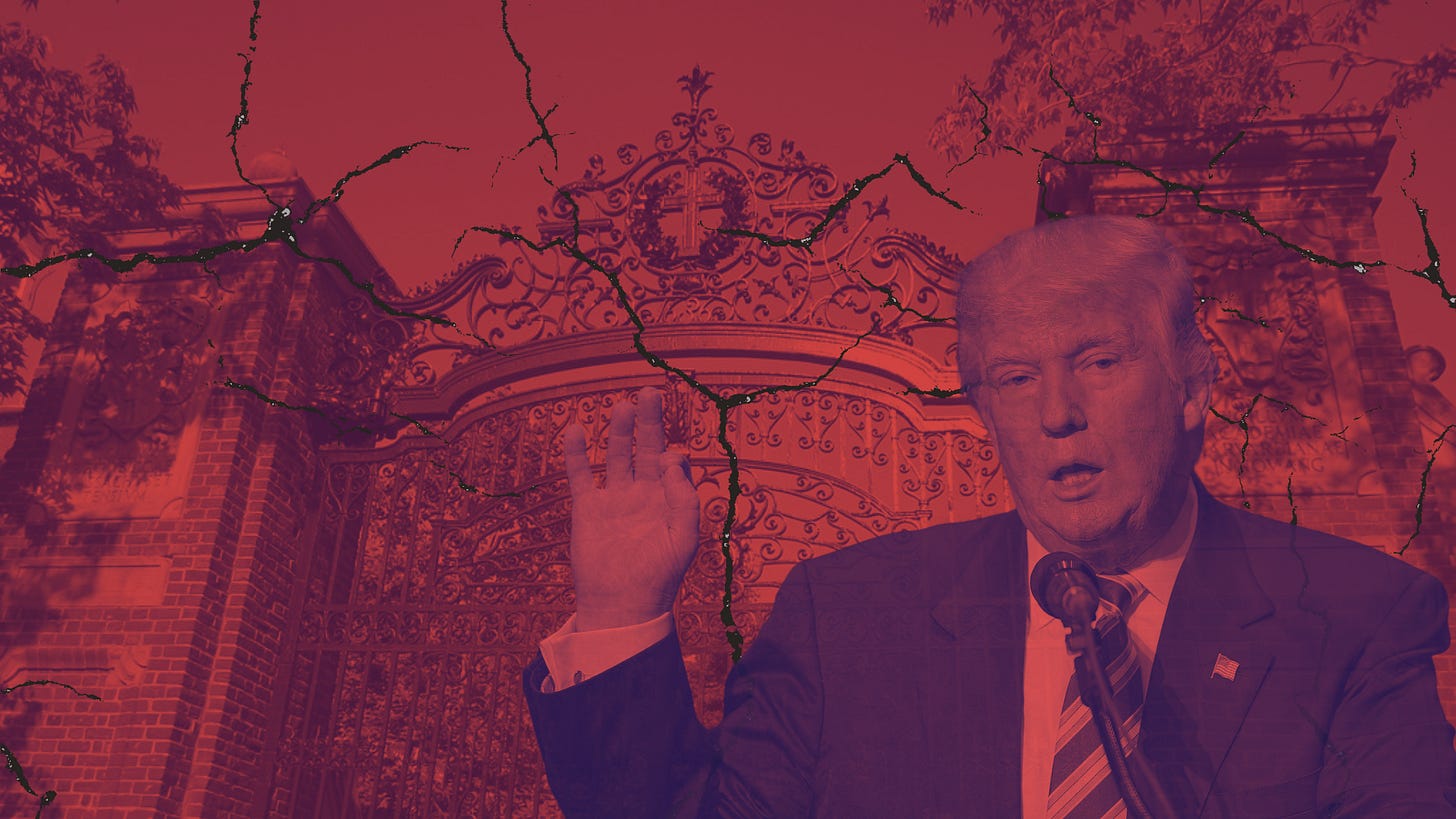The Free Flow — June 5, 2025
Brazilian comedian sentenced to jail for stand-up routine, U.S. to enhance social media vetting for Harvard-affiliated visa applicants, China scrubs Tiananmen history near its anniversary, and more.
This Week At A Glance 🔎
– 🇧🇷 Brazilian comedian sentenced to over 8 years in prison for . . . offensive jokes?
– 🇺🇸 U.S. orders enhanced social media vetting for all Harvard-affiliated visa applicants
– 🇨🇳 Leaked files show China’s AI scrubbing Tiananmen from the internet
– 🇭🇺 Hungary bans Budapest Pride under sweeping anti-LGBTQ law
– 🇬🇧 UK man convicted for Quran-burning protest
First of All 🇺🇲

» U.S. Orders Social Media Vetting for all Harvard-Affiliated Visa Applicants
The U.S. State Department has directed embassies and consulates to immediately begin enhanced screening of visa applicants with any affiliation to Harvard University, citing concerns over anti-Semitism and campus violence.
Details:
The May 30 cable requires consular officers to review the entire online presence of all nonimmigrant visa applicants connected to Harvard, including students, faculty, contractors, and tourists.
Applicants must set their social media accounts to public and submit to review by the Fraud Prevention Unit. Those with restricted or absent online activity may be flagged as “evasive.”
Harvard is serving as a pilot case for a broader policy shift toward expanded social media screening for all visa applicants, as mentioned in our last Free Flow.
» Trump Suspends Entry of Harvard’s International Students
President Trump has issued a proclamation suspending the entry of all foreign nationals seeking to study or join exchange programs at Harvard University for six months, citing national security concerns and alleged ties to foreign adversaries.
Details:
The proclamation may be extended and also instructs the State Department to consider revoking the visas of current international students at Harvard.
» Harvard Sues to Unfreeze Federal Research Funding
Harvard University has filed a motion for summary judgment, seeking to unfreeze $2.5 billion in federal research grants that the Trump administration blocked.
Details:
As reported in a previous Free Flow, the administration froze federal research funding after Harvard rejected government demands regarding campus policies and governance.
We’ve been following Harvard’s lawsuit alleging the funding freeze violated the school’s right to free speech, and its Monday filing revealed the freeze has affected nearly 1,000 projects in areas like pediatric HIV, cancer, and national security.
» Court Revives Immigration Judges’ Challenge to DOJ’s Gag Rule
A federal appeals court has revived a lawsuit brought by the National Association of Immigration Judges challenging a Department of Justice policy that bars immigration judges from speaking publicly without prior approval.
Details:
The gag rule, introduced in 2020 under the Trump administration, requires judges to seek permission before publicly discussing their work, even in personal or academic contexts.
A federal judge previously dismissed the union’s case, stating it belonged before the Merit Systems Protection Board, a venue for employment disputes.
The 4th Circuit ruled that extraordinary circumstances, namely the firing of key Democratic officials overseeing the MSPB and the Office of Special Counsel, rendered those administrative pathways non-functional.
» FCC Commissioner Warns of “Chilling Effect” on Free Speech Under Trump
FCC Commissioner Anna Gomez issued a stark warning about threats to press freedom during a public forum in Los Angeles, citing escalating retaliation against media outlets under President Trump.
Gomez’s Comments: “When you see corporate parents of news providers ... telling their broadcasters to tone down their criticisms of this administration, or to push out the executive producer of ’60 Minutes’ or the head of [CBS] News because of concerns about retribution from this administration because of corporate transactions — that is a chilling effect.”
» NPR and PBS Sue Trump Administration Over Funding Cuts
Last week, NPR and three Colorado news stations sued the Trump administration over a May executive order that cut federal funding to NPR and PBS, alleging it infringed on their First Amendment rights.
PBS filed a similar lawsuit on Friday, claiming Trump engaged in “viewpoint discrimination.”
Context: Trump has publicly expressed his disdain for NPR, calling it “biased media.”
Trump’s Response: Today, the administration formally requested that Congress rescind $9.4 billion in already-approved spending for public broadcasters and foreign aid, including $1.1 billion for NPR and PBS.
The Digital Age 🤖

» Brazilian Comedian Sentenced to Over Eight Years for Discriminatory Jokes Posted Online
On June 3, a federal court in Säo Paulo sentenced comedian Leo Lins to 8 years and 6 months in prison for inciting intolerance through a 2022 stand-up routine that was posted to YouTube.
Details:
The show, titled Perturbador, targeted multiple marginalized groups and was viewed over 3 million times on YouTube before being ordered offline in 2023.
The sentence includes a fine of 300,000 reais for “collective moral damages,” marking one of the harshest criminal penalties ever imposed on a performer in Brazil over speech content.
» Texas Social Media Ban for Minors Fails, but Age-Verification Law Advances
Texas has passed a new law requiring Apple and Google to verify users’ ages on app stores and obtain parental consent for minors to download apps or make purchases. However, a separate Texas bill we’ve been tracking on the Free Flow that would have banned social media use for minors failed to advance.
The Social Media Ban:
The bill, already passed by the state House, failed to pass after the state Senate declined to take it up before the end of the legislative session.
The failed legislation would have gone further than any other current U.S. law in restricting minors' access to platforms like TikTok, Snapchat, and Instagram.
The App Store Law:
The move follows a similar law passed in Utah and is scheduled to take effect in 2026, though it is expected to face challenges on First Amendment grounds.
» Federal Court Blocks Florida Social Media Ban
A federal judge in Florida has issued a preliminary injunction against the state’s new law that would ban social media accounts for children under 14 and require parental consent for those aged 14-15.
Details:
Judge Mark Walker ruled the law “directly burdens youths’ rights to engage in and access speech,” violating the First Amendment.
The decision allows a narrow provision to stand: platforms must terminate accounts for users under 16 at a parent’s request.
» Kentucky City Disables Comments on Official Social Media Accounts
Beginning June 1, the City of Mt. Washington, Kentucky, will disable comments on its official social media accounts. City officials say the move is meant to preserve platforms as information tools, and not forums for public debate.
Details:
The move mirrors actions in New Albany, Indiana, which has limited comments on government posts since January 2025.
Critics argue that preemptively disabling comments stifles dissent, particularly where social media serves as a primary means of civic engagement.
» State Lawmakers Protest Proposed AI Regulation Ban
A bipartisan coalition of 260+ state legislators from all 50 states sent a letter to Congress opposing a provision in the federal budget reconciliation bill that would impose a 10-year ban on state and local AI regulation.
Context:
States like California, Colorado, and Utah have enacted laws to regulate the use of commercial AI, while others have implemented transparency rules or established AI task forces.
The Open Letter:
» D.C. Circuit Upholds Block on Media Matters Probe
On May 30, the U.S. Court of Appeals for the D.C. Circuit upheld a preliminary injunction preventing Texas Attorney General Ken Paxton from enforcing a civil investigative demand against Media Matters for America. The court found “uncontested evidence” that the demand was part of a retaliatory campaign against the organization’s journalism.
Details:
Paxton issued the CID the same day X-owner Elon Musk sued Media Matters over reporting that major companies’ advertisements on X were appearing adjacent to antisemitic and white nationalist content.
The court dismissed Paxton’s claim that the probe was a routine consumer protection inquiry, and found the CID to be “expressly aimed” at Media Matters’ D.C.-based operations.
» OpenAI Defeats Libel Suit Over AI “Hallucination” About Gun Rights Commentator
A Georgia court has ruled in favor of OpenAI in a defamation case, dismissing a lawsuit brought by gun rights activist and radio host Mark Walters over an inaccurate AI-generated claim that he was involved in embezzlement.
Details:
The statement was generated during a conversation with journalist Frederick Riehl, who quickly verified the error and did not believe or publish the claim.
The Court found that the plaintiff couldn’t show the damages and no reasonable person would interpret the ChatGPT output as factual, especially given repeated disclaimers and the user’s awareness of the tool's limitations.
» Leaked Documents Reveal China’s AI-Powered Erasure of Tiananmen History
A major leak of internal censorship files reviewed by the Australian Broadcasting Corporation provides insight into how China’s government uses AI and human moderators to systematically erase any reference to the 1989 Tiananmen Square massacre across domestic platforms.
Censorship Architecture:
More than 230 pages of documents instruct platforms like Douyin (Chinese TikTok) and multi-channel networks to pre-emptively scrub images, texts, and even symbolic patterns — like a lineup of one banana and four apples, echoing the iconic “Tank Man” image.
Chinese platforms deploy computer vision and natural language processing to identify metaphorical dissent, while models like DeepSeek outright refuse to answer questions about the Tiananmen massacre.
A leaked 2022 Douyin training manual labels the Tank Man photo “subversive” and instructs censors to suppress even innocuous symbols like candles or flowers.
» Germany Drafts Big Tech Tax Law for Media Content Use
Germany’s Culture Ministry is drafting legislation to impose a 10% levy on large digital platforms that profit from distributing media content, targeting companies like Google and Meta.
Context:
The move mirrors Austria’s existing digital tax and aligns with recent EU proposals to raise revenue from the platform usage of journalistic content.
Chancellor Friedrich Merz has signaled support, saying Germany is currently too lenient on U.S. tech firms and hinting at a coordinated policy shift.
Such taxes are often framed as economic fairness measures, but can prompt platform backlash and punitive algorithmic shifts, or reduce access to news.
The Brussels Effect: Europe and Beyond 🇪🇺

» EU Opens DSA Investigations Into Porn Platforms
The European Commission has launched formal investigations into Pornhub, Stripchat, XNXX, and XVideos under the Digital Services Act over concerns that they lack effective age verification systems to prevent minors from accessing adult content.
Details:
The probes focus on age verification, risk mitigation for children’s rights, and broader user safety obligations under the DSA.
Platforms found in violation could face fines of up to 6% of their global annual turnover.
» #SkinnyTok Ban Suspected to be a Result of EU Pressure
TikTok has officially removed the #SkinnyTok hashtag from search results worldwide following pressure from the EU Commission and French regulators. According to the regulators, the hashtag had become a hub for content promoting disordered eating and extreme weight-loss practices.
Context:
In April, France’s digital media minister called such content “revolting and absolutely unacceptable,” prompting scrutiny by the media regulator Arcom.
TikTok says this is part of a “regular review,” but the timing aligns closely with EU investigations into the platform’s handling of harmful content.
» Wave of Foreign Agent Laws Targeting NGOs Expands
The list of countries with foreign agent laws, often inspired by Russia and aimed at repressing media freedom, has grown following proposed legislation in Hungary that would empower the government to blacklist and potentially shut down organizations receiving foreign financial support.
Context:
In a mid-May Free Flow, we detailed Hungary’s proposed bill targeting organizations deemed to “threaten national sovereignty.”
Last week’s Free Flow mentioned a petition led by more than 80 editors from major European news organizations urging Hungarian authorities to drop the bill, as well as the passing of a similar foreign agent law in El Salvador.
New or Progressed Legislation:
Republika Srpska: After previously shelving a foreign agent law in 2023 under EU pressure, Bosnia and Herzegovina passed its long-anticipated foreign agent law aimed at NGOs with foreign ties in February.
Slovakia: This may, populist President Zuzana Čaputová signed a law requiring NGOs to disclose foreign funding, mirroring Russian law.
Georgia: After mass protests defeated a foreign agent law in 2023, the government passed a second, stricter version in May 2025, now in effect.
Russia: Authorities expanded enforcement of foreign agent laws in February, requiring designated agents to open special bank accounts from which they cannot withdraw funds, and imposing direct fines from these accounts for
» UK Convicts Quran Burner
On June 2, Hamit Coskun was convicted of a religiously aggravated public order offense for burning a Quran outside the Turkish consulate in London during a protest against President Erdoğan’s government. Coskun was fined £240 and ordered to pay a £96 surcharge.
Details:
During the February 13 protest, Coskun shouted statements critical of Islam while setting the Quran on fire. He was subsequently assaulted by bystanders, one of whom has been charged with assault and possession of a bladed article.
The court ruled Coskun’s actions were motivated by a hatred toward Muslims, while Coskun argued his protest was directed at the Turkish government’s policies and Islamic radicalism.
At UnHerd, our Executive Director Jacob Mchangama wrote, “because Coskun was violently attacked for a protest that was provocative but non-violent, his speech became the offence. This is not justice — it is capitulation.”
» UK Lords Block Data Bill Over AI Copyright Loophole
The UK government’s flagship Data Protection and Digital Information bill is now at risk of collapse after the House of Lords voted for a fifth time to amend it, this time demanding transparency from AI companies over their use of copyrighted material to train models.
Details:
In a previous Free Flow, we summarized the celebrity-backed Kidron Amendment, which would require AI firms to disclose training data sources.
If the Commons and the Lords do not reach a compromise over the Amendment, the bill will be shelved or delayed via the Parliament Act, marking a rare legislative standoff.
Press Freedom Watch 🗞️
Kyrgyzstan Detains Kloop Journalists in Crackdown: Authorities in Kyrgyzstan detained eight current and former staffers of the independent investigative outlet Kloop, with two remanded into pre-trial detention until July 21 on charges of inciting mass unrest. The President’s press office alleges the journalists worked for Bolot Temirov, producing “false investigations,” although Temirov and Kloop have denied the accusations.
Russia Orders a Book Purge: In an escalation of Kremlin-led censorship, Russian distributor Trading House BMM has issued a directive for bookstores to “return or destroy” 37 books by international and Russian authors. The list includes works by Pulitzer Prize-winner Jeffrey Eugenides, British author Bridget Collins, philosopher Slavoj Žižek, and novelist Ryu Murakami.
Texas Shelves Bills that Threatened Anti-SLAPP Protections: Three bills aimed at weakening the Texas Citizens Participation Act, a key shield against SLAPPs, have been shelved in the state legislature. The bills sought to make attorney fee awards discretionary instead of mandatory for speakers who win SLAPP cases, and would have made it easier for plaintiffs to inflate legal costs before dismissal.
Mexican Politicians Accused of Using Gender Violence Laws to Silence Journalists: Female political candidates in Mexico are filing lawsuits for political violence based on gender, a law originally intended to protect women from electoral harassment, against journalists reporting on corruption or public interest issues. On May 15, Journalist Héctor de Mauleón was ordered to take down an article linking a judicial candidate to alleged corruption and barred from future reporting.
New Jersey Court Closes Anti-SLAPP Loophole in Key Ruling: A New Jersey appellate court has reinstated a Jewish newspaper’s right to seek legal fees under the state’s new anti-SLAPP law, even though the plaintiff voluntarily dismissed the underlying lawsuit. The court found that voluntary dismissal cannot be used to dodge accountability under the Uniform Public Expression Protection Act, New Jersey’s anti-SLAPP statute.
Protest Watch ✊
Hungary Bans Budapest Pride Under New Anti-LGBTQ Law: Budapest police have denied a permit for this year’s Budapest Pride march, citing a sweeping new law detailed in a previous Free Flow that effectively bans public LGBTQ+ events under the guise of “child protection.” At least 20 EU countries have condemned the law, which allows fines for organizers and attendees and authorizes the use of facial recognition to identify participants. A top legal adviser to the European Court of Justice also concluded that the law breaches EU fundamental rights protections.
Italy’s Decree-Law Threatens Protest Rights: Italy’s parliament is poised to vote on Decree-Law 48/2025, which criminalizes peaceful protest tactics such as traffic blockades and property occupations, increases penalties, and expands law enforcement's authority. Enacted initially on April 12 as a temporary measure, the decree must be passed into law by June 10 to remain in effect.
Stalin Monument in Moscow Subway Sparks Dissent: A newly installed statue of Joseph Stalin in a central Moscow metro station as part of the Kremlin’s ongoing campaign to rehabilitate the Soviet dictator’s image has blurred the lines between historical reverence and political repression. A protest featuring Putin’s own past criticisms of Stalin was swiftly dismantled, and at least one participant was detained.
Graduation Season Marked by Crackdowns on Pro-Palestinian Student Speakers: Colleges across the U.S. are disciplining student graduation speakers who make critical statements on the war in Gaza. Students at NYU, GW, MIT, Virginia Commonwealth University, and UT Dallas have faced penalties ranging from the withholding of diplomas to campus bans to expulsion from commencement ceremonies.





